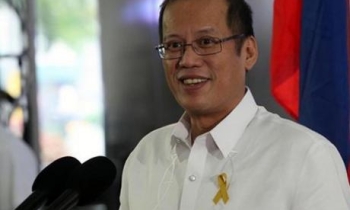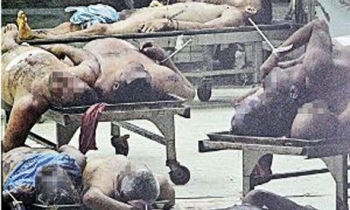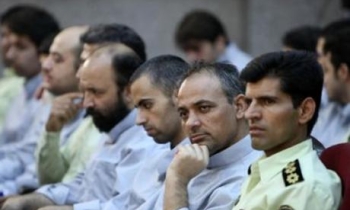As leaders of the world's wealthiest democracies descend on St Petersburg, these G-8 heads of states are not likely to see a critical press coverage from the Russian media. President Vladimir Putin is firmly in saddle, and press freedom is comatose.

On the anvil is a Bill that broadens the definition of extremism to include media criticism of public officials. The draft legislation allows for imprisonment of up to three years for journalists, and the suspension or closure of their publication, if convicted of extremism. The draft Bill, understandably, has sent alarm signals all around.
The World Association of Newspapers (WAN) and the World Editors Forum (WEF) have urged the government to abandon the proposed law. In a letter to the Russian president, WAN/WEF said the law would "further undermine the role of the press to inform the public and lead to even greater self-censorship than already exists." The Paris-based organisations said the vague language of the law "would allow public officials to interpret the law as they please and effectively target their critics."
The lower house of the Russian parliament, the State Duma, approved the "Law on Fighting Extremist Activity" on July 8. It now must be considered by the upper house, the Federation Council, before being signed into law by President Putin. If enacted, the law would broaden the definition of "extremism" to include media criticism of public officials and provide for imprisonment of up to three years for journalists and the suspension or closure of their publications.
WAN/WEF reminded Putin of his remarks supporting press freedom made at the World Newspaper Congress and World Editors Forum in Moscow last month. WAN said that passage of the new law "would constitute a clear breach of the right to freedom of expression."
Amendments to Article 1 of the law broaden the definition of extremist activity to include "public slander directed toward figures fulfilling the state duties of the Russian Federation," as well as "interfering with the legal duties of organs of state authorities," Associated Press (AP) reported. Such vague language allows public officials to interpret the law as they please and effectively target their critics, critics said.

"These amendments would effectively label bold journalists 'extremists,' and further chill what little critical coverage exists in Russia today," Committee to Protect Journalists (CPJ) Executive Director Ann Cooper said. "We call on lawmakers to overturn the bill on a second reading."
International Federation of Journalists (IFJ) General Secretary Aidan White said, "This piece of legislation raises grave concerns that the Russian government is attempting to stifle press freedom and any form of dissent in the country." This new law is far too vague and could make it illegal for media to publish anything critical of the government."
The Russian government has said the purpose of the new legislation is to fight ultra-nationalism. However, existing Russian laws already prohibit inciting violent extremist activity or hatred based on ethnic origin, religion, or affiliation to a certain group. The new amendments, however, would make it possible for authorities to prosecute media for reporting stories that criticise the government, according to IFJ.
Criminal defamation, in any case, is regularly employed as a tool to harass journalists. In April, prosecutors in the western city of Kaliningrad filed criminal libel charges against Arseny Makhlov, publisher of the weekly Dvornik, in relation to three articles that appeared in the newspaper in 2004 and 2005, which reported on local official corruption. The same month, Viktor Shmakov, editor-in-chief of Provintsialniye Vesti was placed under a two-month preventive detention on charges linked to his newspaper's critique of the president of the Russian republic of Bashkortostan
The Russian government, however, has been cracking down on journalists even without this proposed law. Boris Reitschuster, a correspondent for German magazine Focus, was attacked by the police on July 13 when he was taking photographs of anti-G8 protesters, who were themselves the victim of police violence. Reitschuster's mobile phone was briefly confiscated by the police during the incident.

Eike Korfhage and Henning Wallerius, two students working as journalists for Hertz 97.8, a university radio station, were arrested at their home on the night of July 9 by the St Petersburg police, who accused them of participating in an anti-G8 protest and taking photos. They were subsequently sentenced to 10 days in detention for "urinating in public," a charge they denied. German embassy representatives have been able to visit them and said their prison conditions were acceptable.
"Violence against journalists who are in Russia to cover the summit is unacceptable," Reporters sans Frontières (RSF) said. "We are astounded by the 10-day prison sentence imposed on two German students working for a university radio station. We condemn these acts of repression and call on the authorities to free them at once." This heavy-handed police behaviour did not bode well for the G8 summit, the organisation warned.
"We would like to remind foreign leaders taking part in the summit that press freedom is in steady retreat in Russia," RSF said. "Many broadcast media and newspapers have been placed under Kremlin control since Vladimir Putin took over as president. The press is gagged and the independent media are just a shadow of what they were and virtually non-existent in some regions. Self-censorship is widely practised and the authorities are now cracking down on the Internet."
Russia is also unable to ensure the safety of journalists, RSF said. Thirteen have been killed since 2000 and those responsible for their deaths have never been identified. The murder of Paul Klebnikov, the editor of the Russian edition of Forbes, on July 9, 2004 in Moscow remains unpunished. The disappearance of Agence France-Presse correspondent Ali Astamirov following his kidnapping on July 4, 2003 in Inguzhetia has never been solved. Russia's leaders, above all Putin himself, have not shown any sign of taking a strong interest in these cases, RSF said.
"Instead of adopting firm measures to protect journalists and promote the independence of the press, the Russian parliament is now considering a very disturbing bill, one that refers to the defamation of a government representative in the media or on the Internet as 'extremist'," RSF said. "The bill is clearly aimed at preventing any criticism of official decisions taken in the course of the fight against terrorism," the organisation added.

Earlier this month, the ministry of foreign affairs denied an entry visa to the Caucasus Editor and Project Coordinator for the Institute of War and Peace Reporting (IWPR) in London, Thomas de Vaal. The journalist sought entry in response to an invitation from the Russian Union of Journalists (RUJ) to participate in the launching ceremony for the Russian translation of his book Black Garden, focusing on the events and situation in Nagorny Karabakh. The ministry invoked a law which allows the denial of entry to foreigners if considered necessary to guarantee the safety of the state.
"We are sure that the denial of the visa is, first of all, related to the fact that Thomas de Vaal wrote about the Chechen Republic. This theme was present in his articles when he was a correspondent for The Moscow Times and The Times," said Centre for Journalism in Extreme Situations (CJES) Director Oleg Panfilov.
Panfilov also noted that de Vaal "is known as well for having been a witness in London in the legal proceedings on the possible extradition of Ahmed Zakaev". De Vaal told Panfilov that he was surprised by the visa denial since, after having served as witness on the legal proceedings for Zakaev in London, "he has already twice visited Russia". Zakaev, deputy prime minister in the Chechen government, lives in exile in UK.
"Since 2000, we have collected a list of names of journalists who have been denied Russian entry visas, and this list now contains more than 30 names. I think that all this is connected with the Chechen Republic because almost all those journalists to whom a visa was denied either had worked in the Chechen Republic or wrote about it, as is the case with Thomas de Vaal," Panfilov said.
Throughout the conflict, a recent Amnesty International report said, Russian authorities have attempted to control the information publicly available about the human rights situation in Chechnya. The work of independent journalists has been severely curtailed. While the Russian constitution guarantees freedom of expression and freedom of movement and the government of the Russian Federation has not declared a state of emergency in the Chechen Republic, journalists are expected to register with the military headquarters of the Russian armed forces in the North Caucasus when travelling in Chechnya and to travel with members of the security forces in Chechnya. Thus, the conflict has been marked by a distinct lack of full, independent and objective reporting of the abuses, Amnesty said.

The weekly newspaper Chechen Society (Chechenskoe Obshchestvo) was effectively shut down at the beginning of August 2004, after its editor, Timur Aliev, was "advised" to suspend the publication of the paper, and a printing house was forced to discontinue printing it. Founded in Nazran a year ago, this newspaper gave regular updates on the dynamics in the human rights crisis in Chechnya and was one of the few print media that provided objective coverage of contemporary developments in the war-torn republic. It had already been targeted by authorities several times for its coverage of the conflict in Chechnya.
The gagging of the press, of course, is not confined to Chechnya coverage. The number of Russian radio stations that broadcast the news content of Voice of America (VOA) and Radion Free Europe / Radio Liberty (RFE/RL) has fallen from from 72 to nine since September last. The American stations have attributed the move to pressure exerted on their Russian partners through checks on broadcasting licences.
The government's domination is most pervasive in the television media. According to a recent study conducted by CJES and MEMO8, a nongovernmental organisation, the situation in the federal television channels has worsened in comparison with a similar study conducted three years ago: the amount of time allocated to the authorities in news programmes has increased from 91 per cent to 93 per cent and the amount of time given to the opposition has gone down from 2 per cent to 1 per cent.
The study found that 99 per cent of the reports on the authorities had a positive or neutral tone, while the activities by the opposition received mainly negative or at least neutral coverage. The study found that Ren-TV was the only broadcaster providing mostly a neutral coverage and publishing materials criticising leading politicians, including the Russian president. Channel One, Rossiya, NTV were not found to criticise the president even once.
The country's news agencies – Interfax, ITAR-TASS and RIA Novosti – transmit hundreds of news stories everyday but offer little in the way of opinion or analysis. The leading independent English-language websites Moscow Times and Moscow News too steer clear of trouble.
In Russia, it is Putin who rules.









